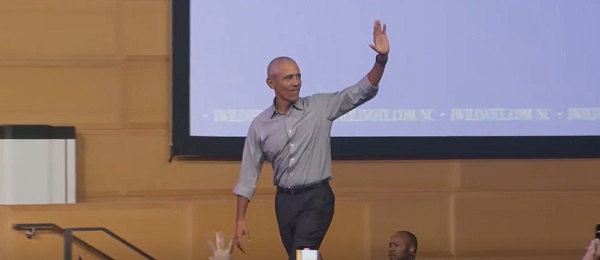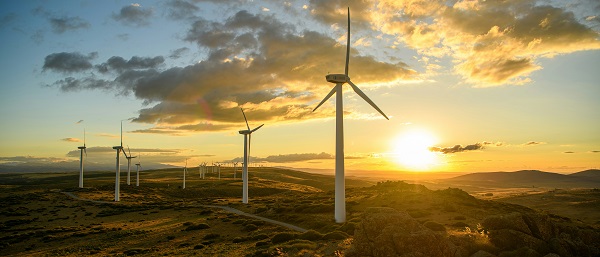Daily Caller
New Analysis Blows Massive Hole In Climate Catastrophe Narrative


From the Daily Caller News Foundation
By Audrey Streb
The Department of Energy (DOE) released a new scientific analysis on Tuesday finding that climate change is not humanity’s most existential threat and that emissions will not devastate the economy as climate alarmists have claimed for years.
Released as the Environmental Protection Agency (EPA) announced that it is moving to repeal a cornerstone climate regulation, the report states that drastic energy policies are unlikely to effectively reverse climate change and could even potentially cause more harm than benefit. Authored by scientists including former Obama DOE Under Secretary for Science Steven Koonin and climatologist John Christy, the report undermines the prevailing narrative of climate catastrophe often touted by Democrats and legacy media calling for a rapid, taxpayer-funded green energy transition.
“Climate change is real, and it deserves attention. But it is not the greatest threat facing humanity. That distinction belongs to global energy poverty,” Energy Secretary Chris Wright wrote in the report’s foreword. “What I’ve found is that media coverage often distorts the science. Many people — even well-meaning ones — walk away with a view of climate change that is exaggerated or incomplete.”
DOE Critical Review of Impacts of GHG Emissions on the US Climate July 2025 by audreystreb on Scribd
The report, titled “A Critical Review of Impacts of Greenhouse Gas Emissions on the U.S. Climate,” states that the impact of global warming on the U.S. economy is expected to be “negligible.”
“CO2-induced warming might be less damaging economically than commonly believed, and excessively aggressive mitigation policies could prove more detrimental than beneficial,” the report reads. “There is evidence that scenarios widely-used in the impacts literature have overstated observed and likely future emission trends.”
Impacts of policies mandating significant cuts on greenhouse gas (GHG) emissions are also projected to be “negligible” because local emissions regulations are unable to significantly slow the global effects of climate change, according to the report.
“Even the most aggressive regulatory actions on GHG emissions from U.S. vehicles cannot be expected to remediate alleged climate dangers to the U.S. public on any measurable scale,” the report reads.
The report states that it is “naive” to assume that extreme weather events like hurricanes or tornadoes are brought about by human impacts on the climate. Furthermore, it states that “most types of extreme weather exhibit no statistically significant long-term trends over the available historical record.”
“These green energy policies hurt people more than the climate risk,” meteorologist Chris Martz told the Daily Caller News Foundation, noting that the report indicates most extreme weather events have not increased over time — and some have even decreased. “Forcing intermittent and unreliable energy on people is going to lead to a poorer standard of living and a poorer quality of life.”
The report and the proposed EPA action to rescind the 2009 Endangerment Finding will be open to public comment, which Wright notes in the foreword is a part of “honest scrutiny and scientific transparency [that] should be at the heart of our policymaking.”
The five authors who drafted the report included several scientists and one economist: Koonin, Christy, . Wright noted that he asked the “diverse team of independent experts” to summarize what is currently known about climate science and how it translates to the U.S.
Christy told the DCNF that “this is not the final product as we are gearing up to address the many public comments that will come in – and we will fix any mistakes we may have made for the final version.”
“There has been a noticeable lack of evidence-based information feeding the climate narrative, and we wanted to bring that to bear in this report. It will surprise many folks I suppose to see the lack of trends in various types of extreme weather after being constantly told their occurrences are increasing,” Christy told the DNCF. “Make no mistake, CO2 is a greenhouse gas that all things being equal will exert a warming influence. The evidence we present is that the impact of that warming is not a developing crisis as the world continues to develop wealth and prosperity.”
Christy also told the DCNF that “without energy life is brutal and short,” noting that meeting energy demand is necessary for human health.
Other energy sector experts have pointed to the DOE report as a landmark release that deals a major blow to the climate alarmism narrative.
“Much to the chagrin of climate ‘panicans,’ Secretary Chris Wright assembled five credible scientists to publish this seminal and important report,” Gabriella Hoffman, director of the Center for Energy & Conservation at the Independent Women’s Forum, told the DCNF. “Let’s clear the air: The science on CO2 isn’t settled. And it’s worthy to have a debate about whether or not it’s actually harmful to human health and welfare. As the authors noted, fixating on CO2 — a component that only makes up 0.04% of the atmosphere — might have more adverse negative impacts than CO2 itself.”
Daily Caller
Obama Made Watergate Look Like A Parking Ticket


From the Daily Caller News Foundation
Richard Nixon resigned in disgrace for a third-rate burglary he tried to cover up. Barack Obama weaponized the federal government against his political enemies – and the media gave him a Nobel Peace Prize and a Netflix deal.
When historians rank presidential scandals, they love to circle back to Watergate. But in terms of long-lasting damage to the rule of law and public trust, nothing Nixon did even touches what happened under Obama. The left’s favorite president didn’t just break norms – he shattered the constitutional guardrails designed to keep power in check, and, in doing so, made Watergate look like a parking ticket compared to his crimes.
Start with the IRS scandal. Obama’s IRS targeted conservative nonprofits – especially Tea Party groups – right as they were mobilizing against his administration. The agency delayed their applications, demanded donor lists, and intimidated citizens into silence. Imagine the outrage if Donald Trump’s IRS had slow-walked liberal organizations like Black Lives Matter or Planned Parenthood. There would have been wall-to-wall CNN coverage and impeachment calls within the hour.
Instead, Obama’s media allies downplayed it, calling it a “misstep” and a “bureaucratic error.” But make no mistake: this was the full force of the federal government being turned against everyday Americans for their political beliefs. And nobody at the top was held accountable.
Then came the spying. Under Obama, the FBI used phony opposition research funded by the Clinton campaign – the Steele Dossier – to justify surveillance of the Trump campaign. Obama’s DOJ and intelligence agencies signed off on secret FISA warrants against American citizens based on evidence they knew was sketchy at best and fabricated at worst. That’s not just unethical – it’s authoritarian.
Watergate was a bad scandal because Nixon tried to cover up a crime. Under Obama, the intelligence community itself became the weapon. It was a full-blown abuse of surveillance power – something straight out of a banana republic. And yet again, no real consequences.
And let’s not forget Fast and Furious. The Obama administration ran guns to Mexican cartels – yes, cartels – with the harebrained idea that they could trace the weapons back to criminal networks. Instead, those guns were used to kill people, including a U.S. Border Patrol agent. When Congress demanded documents, Obama’s Attorney General Eric Holder refused – and Obama shielded him with an executive privilege claim. If that had happened under a Republican president, we’d still be hearing about it in every history class.
The Obama White House also leaned heavily on journalists. James Rosen, a Fox News reporter, was labeled a criminal co-conspirator so the DOJ could secretly monitor his emails and movements. All while Obama claimed to be the most “transparent” president in history.
In Nixon’s case, at least the system worked. Investigative journalism exposed the wrongdoing, Congress took action, and Nixon resigned. But under Obama, the media largely looked the other way, Congress was stonewalled, and the public was fed spin instead of truth.
We were told Obama’s administration was “scandal-free.” That was the sales pitch. But the reality is, Obama normalized a dangerous trend: using the government itself as a political weapon. Not against foreign enemies. Against fellow Americans.
That precedent matters. Because once one side opens that door, the other side feels justified in doing the same. And the next thing you know, trust in our institutions is completely gone – and the republic starts to crack.
Watergate was a dark moment, yes. But Obama’s legacy of institutional abuse, political surveillance, and targeted intimidation has had far more dangerous consequences. It taught a generation of political leaders that the ends justify the means – if you have the right media allies.
If Nixon was forced to resign for a cover-up, then Obama’s behavior deserves far more than a glowing Netflix documentary. It deserves scrutiny, outrage, and, yes, accountability.
Because if we don’t call it what it was, we’re not just rewriting history.
We’re erasing the Constitution.
Brilyn Hollyhand is a 19-year-old political commentator, bestselling author of “One Generation Away: Why Now is the Time to Restore American Freedom”, and host of “The Brilyn Hollyhand Show”. For more of his hot takes you can follow him on socials @Brilyn Hollyhand or visit BrilynHollyhand.com.
Daily Caller
Trump’s Wind Diatribe Caught Von Der Leyen By Surprise


From the Daily Caller News Foundation
By David Blackmon
President Donald Trump caught European Union President Ursula Von Der Leyen by surprise during a press event announcing the US/EU trade agreement Monday when he launched into a three-minute diatribe targeting the wind industry. Von Der Leyen, a longtime German government official who held a senior position in the Angela Merkel government during its heavy expansion of that country’s vaunted Energiewende experiment, was visibly discomfited as Trump slammed the form of intermittent generation she has done so much to promote throughout her career.
Referring to the industry as “a con job,” Trump added, “It’s very expensive. And in all fairness, Germany tried it, and wind doesn’t work,” as Von Der Leyen’s polite smile faded to a stern frown. But Trump was far from finished.
“You need subsidy for wind. And energy should not need subsidy,” the U.S. President continued in the unique Queens dialect he’s retained since childhood, adding, “It’s the most expensive form of energy. It is no good. They’re made in China, almost all of them.”
For a European for whom English is a second language, Trump’s direct and often shorthand way of expressing his thoughts had to have been thoroughly confusing to the EU President, but the message was clear: On energy and the fading drive to the net-zero fantasy with which the EU and U.K. remain obsessed, Trump and America are moving in the opposite direction.
Trump and the Republican majorities in congress, through a combination of executive orders, aggressive administrative moves, and language to eliminate Biden-era tax breaks and subsidies for wind and solar in the One Big Beautiful Bill Act (OBBBA) have already essentially ended former president Joe Biden’s dreams of a vibrant offshore wind sector. Without those tax incentives and subsidies, the business plans for those massive projects are unsustainable and the sector is now seeing a flood of big companies like BP, Shell, Equinor, Orsted, and others cancelling projects and taking massive write-downs on their virtue-signaling investments.
The news for onshore wind projects is less terrible, but only marginally so. A new study published by business advisory giant FTI Consulting finds that at least 320 onshore projects with a total nameplate capacity of more than 100 GW are “no longer economically viable” in the wake of the OBBBA’s enactment. The authors go on to say that the new law will make it “significantly harder, if not impossible, to attract capital and meet key development milestones,” signaling the likelihood of a wave of capital flight out of the industry I wrote about in early July.
Trump’s critics like to claim the President’s anti-wind power stance is driven by large contributions by the “fossil fuels” industries and an irrational thought process. But the truth is that the President was a critic of the wind industry and Germany’s Energiewende endeavors long before he dreamed of running for president. Trump’s disapproval of weather-dependent forms of energy have grown out of his observations of the de-industrializing impacts they have had in Germany beginning 20-25 years ago, and, more recently, in the UK.
Trump understands that, despite claims wind is among the cheapest form of power generation, the reality is that electricity costs rise rapidly everywhere it becomes a significant part of an integrated grid. The higher power costs drive all forms of industrial operations to relocate where power is cheaper, and, as often as not, that road leads to China.
The UK has the highest cost of industrial power on earth today, and Germany isn’t far behind. Trump is perhaps a rare form of political figure who is able to connect the cause of this problem with its inevitable effect.
After watching first the Obama administration and more recently Biden’s appointees and handlers strive to take America down this same road to economic ruin, Trump is determined to not just save what remains of American industrial might after 40 years of globalism, but to rebuild it. He understands that the most effective way to drive that shift is to reverse the energy and climate policy regimes of both prior Democratic administrations.
These are thought processes that are completely foreign to a central planner like Ms. Von Der Leyen, which helps to explain her deer-in-the-headlights reaction to Trump’s diatribe about her favored wind industry.
David Blackmon is an energy writer and consultant based in Texas. He spent 40 years in the oil and gas business, where he specialized in public policy and communications.
-

 COVID-192 days ago
COVID-192 days agoTamara Lich’s Prosecution Is A Warning To Western Canada
-

 Alberta2 days ago
Alberta2 days agoAlberta’s New School Library Guidelines Make Sense
-

 Daily Caller2 days ago
Daily Caller2 days agoTrump Halts Preferential Treatment For ‘Unreliable, Foreign-Controlled’ Wind Energy
-

 Artificial Intelligence2 days ago
Artificial Intelligence2 days agoYouTube to introduce Digital ID Age Checks and AI Profiling
-

 Business2 days ago
Business2 days agoMcTeague: Will Carney cave to radical climate activists?
-

 Addictions2 days ago
Addictions2 days agoWhy is B.C.’s safer supply program shrinking?
-

 conflict1 day ago
conflict1 day agoCanada to recognize Palestinian state at UN, sparking outrage
-

 Business1 day ago
Business1 day agoTrump says no deal with Canada if it recognizes Palestinian state





